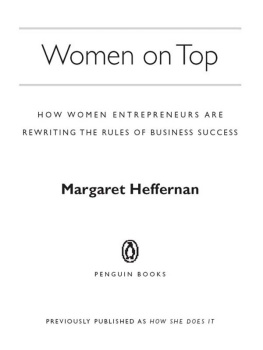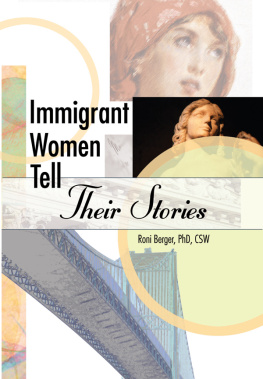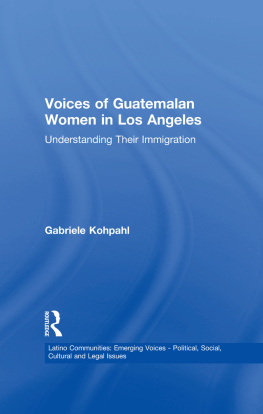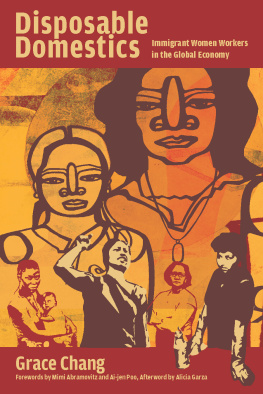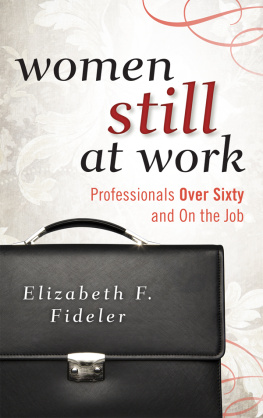Thank you for buying this ebook, published by NYU Press.
Sign up for our e-newsletters to receive information about forthcoming books, special discounts, and more!
Sign Up!
About NYU Press
A publisher of original scholarship since its founding in 1916, New York University Press Produces more than 100 new books each year, with a backlist of 3,000 titles in print. Working across the humanities and social sciences, NYU Press has award-winning lists in sociology, law, cultural and American studies, religion, American history, anthropology, politics, criminology, media and communication, literary studies, and psychology.
Immigration and Women
NEW YORK UNIVERSITY PRESS
New York and London
www.nyupress.org
2011 by New York University
All rights reserved
References to Internet websites (URLs) were accurate at the time of writing. Neither the authors nor New York University Press is responsible for URLs that may have expired or changed since the manuscript was prepared.
Library of Congress Cataloging-in-Publication Data
Pearce, Susan C.
Immigration and women : understanding the American experience / Susan C. Pearce, Elizabeth J. Clifford, and Reena Tandon.
p. cm.
Includes bibliographical references and index.
ISBN 9780814767382 (cl : alk. paper) ISBN 9780814767399
(pb: alk. paper) ISBN 9780814768266 (ebook)
1. Women immigrantsUnited States. 2. United StatesEmigration
and immigration. 3. ImmigrantsGovernment policyUnited States.
I. Clifford, Elizabeth J. II. Tandon, Reena. III. Title.
JV6602.P43 2011
305.48969120973dc22 2010048352
New York University Press books are printed on acid-free paper, and their binding materials are chosen for strength and durability. We strive to use environmentally responsible suppliers and materials to the greatest extent possible in publishing our books.
Manufactured in the United States of America
c 10 9 8 7 6 5 4 3 2 1
p 10 9 8 7 6 5 4 3 2 1
Acknowledgments
The authors would first and foremost like to thank the many women who were gracious and generous enough to share their stories with us; without these immigrating women, there would have been no Immigration and Women. While some are named in this book, others chose anonymity, and we use pseudonyms to refer to them. We thank all equally. Second, we gratefully appreciate Ilene Kalish, Aiden Amos, and Despina Papazoglou Gimbel of New York University Press, as well as Salwa Jabado, formerly of the Press, for all of their assistance, advice, and encouragement, as well as their professional skills in moving this book to press.
Susan C. Pearce would like to thank the Department of Sociology at East Carolina University for its support and advice in completing this project, with particular appreciation to department chair Leon Wilson and to former chair Lee Maril, now director of the ECU Center for Diversity and Inequality Research, which is an important home for this research. She would like to thank the members of the ECU Womens Studies Program and Melinda Kane for feedback on draft chapters and Chris Baker for his enthusiastic assistance in the many details of editorial work. Susan gratefully acknowledges the financial support of the Center for Womens Studies of West Virginia University, directed by Barbara Howe, and of the WVU Eberly College of Arts and Sciences. The Division of Sociology, Anthropology, and Criminal Justice at WVU, chaired by Melissa Latimer, was an important home for the books inception and initial research. Susan is also indebted to the support of Natalie Sokoloff, James Friedberg, Laura Douglas, Pat Hatch, and Val Vojdik. She would like to thank the many individuals who helped open doors to interview contacts, including Don Mitchell, Alex Stepick, and Rachel Owens, among others, who made the research process so fruitful and enjoyable. She thanks her family for support, inspiration, and distractions. Finally, huge kudos to her coauthors, Beth and Reena, for sharing this project and for their never-ending energy across its many stages.
Elizabeth J. Clifford wishes to thank especially her coauthors, Susan and Reena, for their vision, support, and hard work on this project. She would also like to thank her colleagues in the Department of Sociology, Anthropology, and Criminal Justice at Towson University, as well as those in other departments and divisions of the university, who share her interest, passion, and commitment to issues of immigration. Her husband and parents also deserve particular mention, for their encouragement, support, and wisdom to know when, and when not, to ask how the book was going. Lastly, her children, Quincy and Ella, made this work worthwhile and at the same time provided frequent needed, and enjoyable, distractions from it. She hopes someday they will read it. She would also like to thank Towson University for granting a semester of sabbatical leave, which helped facilitate the research and writing of this book.
Reena Tandon would like to thank all those who have been a part of her immigrating life through the inception and completion of this book: first to the coauthors, Susan Pearce and Elizabeth Clifford, companions in writing, who kept it going for her through the transitions. She would like to thank Constance Nathanson for the advice and discussions that helped extend her research interests in the U.S. context and Kenneth Hill, former director of the Hopkins Population Center, for his support that helped her research find ground in new soil. She owes gratitude to Priscilla Gonzales, Xiomara Corpeno, Luna Ranjit, and Nahar Alam for their support with organizing interviews and translations. And those whom Reena cannot thank enough are her family, her husband, and friends and colleagues across the globe, who are sources of sustenanceemotional and intellectualespecially her mother, herself an immigrant, who holds the fluid worlds together for her. For her daughter Ananyawhose hand she was holding when this project started and, as the book was ending, realized that it was her daughter who held her hand... and whose immigrating life will continue beyond her ownshe has no words.
An earlier version of , with the title Mighty Oaks among Us: The Quiet Revolution of Immigrant Womens Entrepreneurship in the United States, was presented at the annual meeting of the American Sociological Association, Boston, Massachusetts, August 1114, 2008, and Susan is grateful for the feedback of Vasilikie Demos on that version.
1
We Cant Go Back
Immigrant Women, Intersections, and Agency
Women are migrating and will continue to do so. Their needs are urgent and deserve priority attention. Only then will the benefits of international migration be maximized and the risks minimized.
United Nations Population Fund, 2006
In 1836, a young Polish woman named Ernestine Susmond Potowski Rose made her way across the Atlantic to her chosen destination, the United States. Her exit from Poland was prompted by her adamant refusal to agree to an arranged marriage. Ernestine had filed a lawsuit against her father, a Jewish rabbi, over control of her inheritance; she arrived, consequently, after sojourning in other European countries, marrying an Englishman, and espousing an avowed rejection of religious beliefs regarding womens inferiority. An active and controversial leader and eloquent public speaker for the movements to abolish slavery and forward womens rights, Ernestine Rose went on to earn the nickname of adulation Queen of the Platform.


